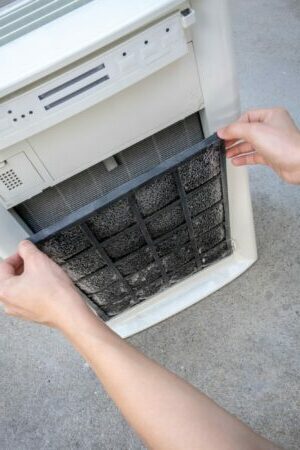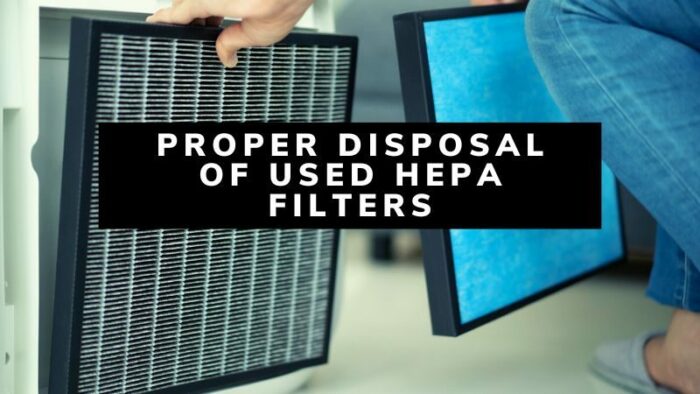It is generally not recommended to recycle HEPA filters. These filters trap tiny particles and contaminants, which may still contain them even after use. Recycling a used HEPA filter could potentially release these particles into the environment, defeating the filter’s purpose.
Additionally, the fibers that make up a HEPA filter are very fine and difficult to separate, which makes it difficult to recycle the filter in a way that preserves its effectiveness.
Suppose you have a used HEPA filter that you no longer need. In that case, it is generally best to dispose of it responsibly by placing it in a sealed bag and disposing of it in a designated waste container.
What Contaminants Are In a Used HEPA Filter
HEPA filters are designed to trap extremely small particles and contaminants, including:
- Pollen
- Dust
- Pet dander
- Mold spores
- Bacteria
- Viruses
- Tobacco smoke
- Other air pollutants
These contaminants can accumulate in the filter over time and may still be present even after it has been used.
It is important to note that the specific contaminants present in a used HEPA filter will depend on the environment in which it was used. For example, a HEPA filter that has been used in a household with pets may contain more pet dander than a filter that has been used in a smoke-free environment.

Where to Dispose of Old HEPA Filters
It is generally best to dispose of used HEPA filters responsibly, such as by placing them in a sealed bag and disposing of them in a designated waste container. Some local governments may have specific household hazardous waste disposal guidelines, including used HEPA filters. You can check with your local government or waste management agency to see if they have any specific guidelines or recommendations for the disposal of used HEPA filters.
Suppose you cannot dispose of the used HEPA filter through your local waste management system. In that case, you may be able to find a hazardous waste disposal facility in your area that will accept the filter. It is essential to follow all local guidelines and regulations when disposing of a used HEPA filter.
Manufacturers That Accept Used HEPA Filters
Some manufacturers may accept used HEPA filters for disposal or recycling. However, it is essential to note that the availability of this service may vary by location and manufacturer.
If you are interested in finding out if a particular manufacturer will accept used HEPA filters for disposal or recycling, you can try contacting the manufacturer directly to ask. You can also check with your local waste management agency or hazardous waste disposal facility to see if they have any information on the disposal or recycling of used HEPA filters.
What Are HEPA Filters Made of?
HEPA filters are made of densely packed fibers to create a porous material. The threads used to make HEPA filters are typically made of glass or synthetic polypropylene. The fibers are extremely fine, with diameters typically less than 0.5 microns.
The fibers are arranged to create many small openings or pores, allowing the filter to trap extremely small particles and contaminants. The fibers are also treated with a chemical binder to hold them together and create a more stable filter material.
HEPA filters are designed to be very efficient at trapping particles, and they can remove at least 99.97% of particles that are 0.3 microns or larger. They are often used in air purifiers, vacuum cleaners, and other types of equipment to help improve indoor air quality.
The Environmental Impact of Disposing of Used HEPA Filters
HEPA filters are designed to trap and remove small particles from the air, making them an essential tool for improving indoor air quality. However, when these filters are disposed of improperly, they can hurt the environment.
One of the leading environmental concerns with the disposal of used HEPA filters is the release of trapped particles back into the air. If the filter is not properly sealed before disposal, the particles it has captured can be released into the environment, potentially contributing to air pollution.
In addition to releasing particles into the air, improper disposal of used HEPA filters can also lead to the release of potentially harmful chemicals. Many HEPA filters are treated with chemicals to improve their efficiency and lifespan. If these filters are not disposed of properly, these chemicals can leach into the soil and water, potentially harming plants and wildlife.
Proper disposal of used HEPA filters is essential to protect the environment and ensure the community’s health and safety. Following proper disposal procedures can minimize these filters’ environmental impact and help create a cleaner and healthier world for all.
Conclusion
HEPA filters are an effective tool for improving indoor air quality by trapping small particles and contaminants. These filters are made of densely packed fibers and treated with a chemical binder to create a stable filter material.
While it is generally not recommended to recycle used HEPA filters due to the potential release of trapped particles and the difficulty of separating the fibers, it is essential to dispose of them in a responsible manner, such as by placing them in a sealed bag and disposing of them in a designated waste container. Some manufacturers may accept used HEPA filters for disposal or recycling, but this availability may vary by location and manufacturer. It is always important to follow local guidelines and regulations when disposing of a used HEPA filter.

